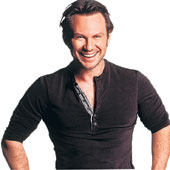 |
| Christian Slater: Play-time |
Hollywood star Christian Slater is back in the West End after his triumphant turn as Randle McMurphy in One Flew Over the Cuckoo’s Nest between 2004 and 2006. This time he’s in maniacal mode again, tackling the role of Buddy Ackerman, the soulless career-crushing producer from hell in Swimming with Sharks.
An innocuous question, however, about the pressure of following Cuckoo’s Nest with another smash seems to strike an unexpectedly raw nerve. “Come on, dude, it’s a risk, it’s a challenge, but I’ll do my best!” he says, smiling through gritted teeth. An attempted comparison between the stage play and the original Kevin Spacey movie is also disdained. “It’s not like everybody goes, ‘Buddy Ackerman? Oh, Kevin Spacey!’ Nobody thinks that!”
Slater, up close and personal, like late-era Marlon Brando, is a strange and mercurial mix of galumphing swagger and hypersensitivity. An effortlessly natural actor and a formidable stage and screen presence, his blatant fragility is protected, barely, by a carapace of cockiness.
He is keen to talk. But there is an elephant in the room — namely his multiple arrests during the drug-addicted bad-boy years of high fame (a three-month jail sentence in 1998). Slater’s minders have made it clear that he doesn’t want to discuss the difficult stuff. And so we talk awkwardly, like nervous first daters, about everything but.
So we do the play some more. The story of a naive Hollywood assistant who comes to work for, and is gradually destroyed by, Slater’s Ackerman is intoxicating stuff, he says. His speeches are so devastating, and his venom so relentless, that sometimes he gets lost in the character.
Slater begins to explain his acting technique and about how he suffered a crisis in confidence during a dark period in the mid-1990s. Which, it seems, is the perfect time to introduce the elephant. So, I say, was this the same time when he was... “Oh, this is the ‘difficult’ section of the interview!” he interrupts, deadpan. And yet, I timidly persist, he has spoken in the past about how his bad-boy screen image had infected his private life, which seems like a pivotal issue. “Who knows what I said 10 years ago? I can barely remember what I said 10 minutes ago! Just drop it!”
He’s yelling now, in full flight. “Who the f*** hasn’t had a past?! And had moments in their life when they’ve gone through s***?” Rage spent, a strange atmosphere descends upon the room. Slater, seemingly distracted, answers a few more questions before suddenly shoehorning in the bones of an apology.
“I’m probably a little bit more boisterous now because I’ve been playing Buddy Ackerman. I literally just walked into this room after six hours of being tyrannical, so it’s hard to remember who I am and get back to that.” He pauses, looks away, and then says softly, “I’m not any of that crap.”
We are now, officially, in the postcoital stage of the interview. He talks fluidly and fondly about his New York childhood and about hanging out, as a five-year-old, with his theatre actor dad, Michael. Slater has just finished a film, Slipstream, written and directed by Anthony Hopkins. He has lined up his next two projects — a sci-fi movie shooting in Iceland and his own directorial debut, an adaptation of William Viharo’s “romantic, goofy” novel Love Stories are Too Violent For Me.
But generally, he says, he’s more Zen about his career these days. “It’s not like someone like Brando means more to me than the guy who is working in the kitchen for us right now!” Why? I ask. Is he an actor too? “Yes, phenomenal,” he says, not missing a beat. “I’ve learnt a lot from him.”
(The Times)











